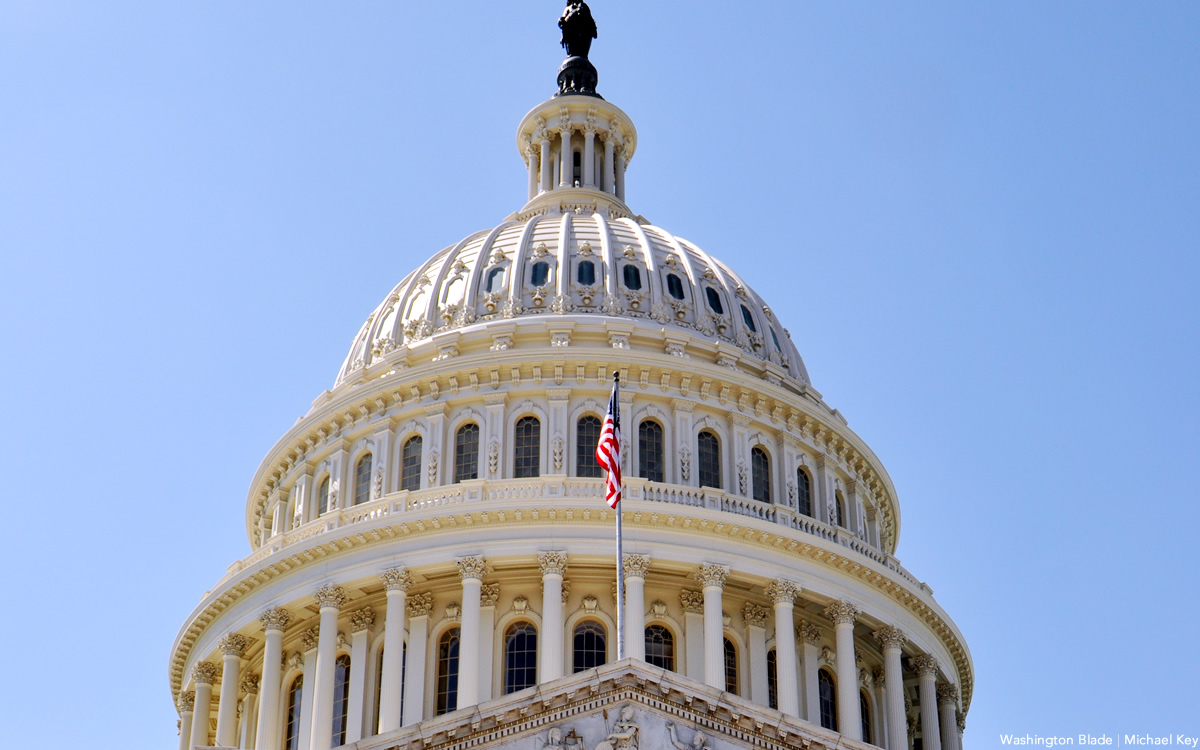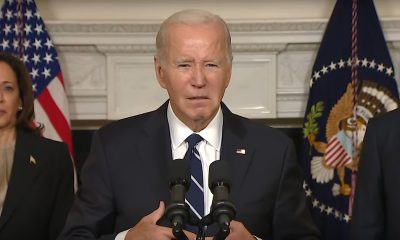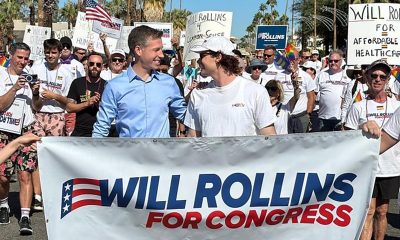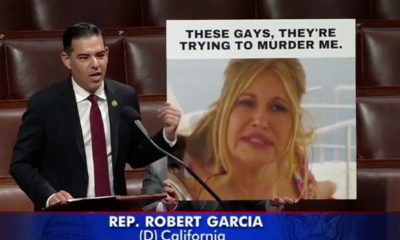Congress
EXCLUSIVE: Markey bill would offer additional support to LGBTQ elders
Measure would create Office of LGBTQI Inclusion within HHS

U.S. Sen. Ed Markey (D-Mass.) will introduce a bill on Friday to support LGBTQ elders and older adults living with HIV by establishing an Office of LGBTQI Inclusion within the U.S. Department of Health and Human Services.
Among other responsibilities, the office would advocate, coordinate activities, issue policy recommendations, and oversee the collection of data from these communities.
A major piece of the work to improve health equity at HHS under the leadership of Secretary Xavier Becerra and Assistant Health Secretary Rachel Levine has been data collection initiatives for LGBTQ and other populations that can encounter barriers accessing care.
The Elder Pride Act will also “establish a rural grants program to serve the unique needs of rural LGBTQI+ older adults, including through education and training, community outreach and creation of community spaces, and improved cultural competency,” according to a press release announcing the legislation, which the senator’s office previewed exclusively with the Washington Blade.
“After years of exclusion and discrimination from health care settings, workplaces, and their local communities, LGBTQ+ older Americans deserve the protections their neighbors are afforded,” Markey said.
“Queer and trans elders should be able to age with dignity, grace, and surrounded by community,” he added. “The Elder Pride Act will ensure that all older adults are able to have access to the care and services they need.”
Cosponsoring senators include Bob Casey (D-Penn.), Ron Wyden (D-Ore.), Alex Padilla (D- Calif.), and Tammy Baldwin (D-Wis.). The legislation’s provisions were included in a pair of bills introduced earlier this year by U.S. Rep. Suzanne Bonamici (D-Ore.), who chairs the Congressional Equality Caucus’s Aging Issues Task Force.
The press release from Markey’s office also highlights several of the challenges faced by LGBTQ older adults vis-a-vis their cisgender and heterosexual peers: Fewer sources of support. higher poverty rates, poorer healthcare, poorer health access, and poorer health outcomes.
At the city and county level, older adults are served by local area agencies on aging (AAAs), which receive services and activities from HHS. Fewer than half of these organizations report that they will be able to provide LGBTQ-specific activities by the time the population of LGBTQ elders reaches 7 million, which is expected by 2030.
Congress
EXCLUSIVE: Sen. Padilla and wife Angela talk LGBTQ mental health
Couple to receive award from Gay Men’s Chorus of L.A. on Sunday

U.S. Sen. Alex Padilla (D-Calif.) and his wife, Angela Padilla, spoke with the Washington Blade for an exclusive interview last week ahead of their receipt of Voice Awards from the Gay Men’s Chorus of Los Angeles at a ceremony on June 30.
“I’ve known members” of the organization “off and on over the years, going back to my days on the city council in Los Angeles,” when battles were waged over California’s Proposition 8 banning same-sex marriage, Padilla said.
“I was proud to be an ally for a long time, but especially in those moments, really, as a public official, as an elected official, knowing how important allyship was,” he said, stressing “the tremendous talent of the chorus” and “what they represented individually and as a group” serving as allies for “young people who may not necessarily grow up in a supportive environment or in supportive families.”
“I work very closely with Joseph Guardarrama,” a board member for GMCLA, “for many years now on my nonprofit, and it’s all in support of mental health and wellness and educating people on how to get help, why they should get help, and why it’s important to take care of your brain,” Mrs. Padilla said by phone.
“I started FundaMental Change in 2017,” she said, to push for “the mental change that I feel that we have to have as a society when it comes to how we look at [and] how we treat mental health conditions.”
The senator’s wife added that LGBTQ people are twice as likely to have a mental health condition while dealing “with so much more social stigma and discrimination” than their straight and cisgender counterparts.
“This month we’re going to have a table for June 30 working with the [California] Department of Mental Health at the Pride parade,” she added. FundaMental Change also operates an LGBT Youth TalkLine and Trans Lifeline.
Padilla noted the organization’s work combatting stigma. “One thing that we recognize both coming from Latino families is the need to overcome stigma,” he said. “There’s a lot of misunderstanding or misperceptions about mental health.”
The effort is also central to the senator’s work as a policymaker, he said, referencing the bipartisan Senate Mental Health Caucus that he founded alongside U.S. Sens. Tina Smith (D-Minn.), Thom Tillis (R-N.C.), and Joni Ernst (R-Iowa) to serve as “a forum for us to share stories.”
“It’s been fascinating, there are more than 30 members of the caucus now, so about a third of the United States Senate,” he said. “It’s 50/50 Democrats and Republicans,” and when approached, every member had a story to share, whether about “something that they’ve been through [or] somebody in their family, a colleague, a neighbor who can relate.”
Padilla said his decision to announce the formation of the caucus concurrently with his visit to the San Francisco LGBT Community Center “was very intentional.”
When it comes to mental health, “We’ve really prioritized trying to develop bipartisan solutions,” he said, “because those are more sustainable here in Congress.”
The first bill backed by the caucus was Padilla and Tillis’s Local 9-8-8 Response Act of 2023, which “was to require the FCC to move to implement the geolocation technology to the 988 system.”
Unveiled by the Biden-Harris administration in 2022, the 988 Suicide and Crisis Lifeline is operated by the U.S. Department of Health and Human Services Substance Abuse and Mental Health Services Administration. The program provides the option for callers to reach specialized LGBTQI+ affirming counselors by pressing “3.”
On the importance of geolocation technology, Padilla said “if I’m here in Washington, and have a need to call 988, my area code on my phone is Los Angeles — so, I’d be passed through to the Los Angeles providers.”
The senator noted that the FCC “is moving forward with those improvements” independently of his bill’s path forward in Congress.
More broadly, some of the policy challenges concern supply and demand problems. “From a bigger picture, longer term perspective, we’re talking about the workforce needs,” Padilla said. “So, what’s the game plan for [getting] more psychologists or psychiatrists or counselors, more therapists, more everybody in the field to better serve people across the country?”
Padilla also discussed the importance of “cultural competence” as a means of guaranteeing the best possible treatment. “When we ask people to go get help, if there’s somebody that they can relate to or that they know gets them, the better quality experience in treatment is going to come,” he said.
“We’re not quite there yet with the Republican colleagues, but I have faith that in time we will get them there,” the senator added. “And again, the LGBTQ community is a prime example. You’ve got to feel comfortable going to somebody when you need help.”
Padilla said, “not everybody comes from a supportive environment; not everybody lives in a city or a state that is supportive. And at this particular time politically, they’re really under attack. They’re being targeted acutely. And that’s more reason and urgency to speak up and stand up.”
On Sunday, the Padillas will share the stage with the recipients of the third GMCLA Voice Award, from the critically acclaimed HBO series “We’re Here,” which follows drag queens as they travel the country to perform in one-night-only performances in small towns.
Mrs. Padilla celebrated the ways in which drag has brought communities together, recalling when RuPaul’s Drag Race “was first airing and it was like everyone was so interested in watching the show” and “it just brought people from everywhere.”
“I have a lot of frustrations, as a Latina, with the misrepresentation of our community and our culture in television and movies,” she said. “And I feel like every opportunity that you get to see something that’s just authentic — it’s such a benefit to everyone. It really helps us understand that we have more in common than not.”
“Drag is not new,” the senator said. “It goes back generations in the United States and I think for the LGBTQ+ community it can be can be very empowering, as an outlet for performers, but also participants in an audience to see on stage what you may not see in other places.”
Republican-led efforts to restrict access to drag performances, especially by young people, “feels like it’s an act of desperation,” Mrs. Padilla said.
“I think they’re resisting something that they don’t understand. I just think it’s really coming from a place of fear. And really not understanding the human behind it,” she said, adding that the reactionary forces are a product of the LGBTQ movement’s success and “that feeling of it’s out of their control.”
“The diversity of our communities, the diversity of our country, is a big source of strength,” Padilla said. “It’s just not always been embraced. I think a lot of people either misinterpret it or frankly exploit it to cause divisions in society.”
“We can’t ignore the political climate that we’re living in,” the senator said, “heightened only by the fact that it’s a presidential election year and we see who the Republican nominee is going to be.”
Looking ahead to November’s elections, he said, “as with so many other issues, LGBTQ+ rights and opportunity in the future — It’s a 180-degree difference between Joe Biden and Donald Trump. Let’s not take it for granted. Let’s not take it lightly. Let’s get out and vote.”

A group of drag queens on Tuesday traveled to D.C. to lobby members of Congress to support pro-LGBTQ legislation.
“Drag Race Philippines” judge Jiggly Caliente, “RuPaul’s Drag Race” season 13 contestant Joey Jay and Brigitte Bandit urged lawmakers to support the Equality Act, which would add gender identity and sexual orientation to the Civil Rights Act of 1964, and the Transgender Bill of Rights, which would add trans-specific protections to federal nondiscrimination laws.
Caliente, Jay and Bandit met with U.S. Reps. Juan Ciscomani (D-Ariz.), Mark Pocan (D-Wis.), Jasmine Crockett (D-Texas), Delia Ramirez (D-Ill.), Greg Casar (D-Texas), and Jen Kiggans (R-Va.) and/or their staffers.
Jay posted to her X account a picture of her, Caliente, and Bandit outside Crockett’s office. The Texas Democrat in response said “you’re always welcome, queens.”
You're ALWAYS welcome, queens! https://t.co/MlUrW3TOJA
— Congresswoman Jasmine Crockett (@RepJasmine) June 25, 2024
MoveOn organized the visit, which it called the Drag Lobby Day.
“Today we brought together a trio of advocates and drag artists to stick up for LGBTQ folks, talk about what’s at stake and fight back against some extremist, hateful attacks, and narratives from conservative politicians,” said MoveOn Campaign Director Nakia Stephens during a press conference outside the U.S. Capitol.
Caliente said the Equality Act and the Trans Bill of Rights “will make it easier for people to find and keep employment and protect our communities more fully from discrimination in housing, health care, and so much more.”
Jay, who now lives in Phoenix, cited statistics that indicate 320 trans people were killed in 2023. Jay also stressed to conservatives that drag queens and LGBTQ people are not “trying to shove our lifestyle down your throats.”
“We are just trying to live in peace without fear of being murdered,” said Jay.
(WASHINGTON BLADE VIDEO BY SEAN KOPEREK)
Bridget Bandit — known as the “Dolly of Austin” — has testified against two anti-drag bills in Texas while in drag. Bandit noted she joined an American Civil Liberties Union of Texas lawsuit against the state’s Senate Bill 12, which would have criminalized drag shows and other performances that took place in front of children, “to fight for our freedom of expression.”
A federal judge last September blocked the law from taking effect.
“This fight is far from over,” said Bandit. “We continue to face the effects of this harmful rhetoric legitimized by our lawmakers.”

Sean Koperek contributed to this story.
Congress
Garcia slams effort to ban drag shows as GOP passes NDAA with anti-LGBTQ riders
Equality Caucus denounces anti-LGBTQ amendments

U.S. Rep. Robert Garcia (D-Calif.) slammed Republican U.S. Rep. Josh Brecheen’s (Okla.) effort to ban drag shows on American military bases during a debate over the annual National Defense Authorization Act spending bill on Thursday.
The appropriations package, which contains five anti-LGBTQ riders pushed by House GOP members, was passed on Friday.
“We know there are a lot of threats to the health and well-being of our service members and their families: poisoned water, toxic mold in military housing, PTSD, and suicide,” said Garcia, who is gay and a co-chair of the Congressional Equality Caucus.
“So I’m stunned to see that the Republican idea to protect our troops is to ban drag shows,” he said. “Mr. Speaker, my Republican colleagues want us to believe that ‘these gays are trying to murder us.’ They want us to believe that drag is harmful, or immoral and wrong. This is ridiculous.”
“We can document and celebrate drag shows on military bases since the late 1800s, and through both world wars,” Garcia continued. “The USO and the Red Cross supported drag during World War II. That’s right: the Army that defeated Hitler and saved the world included drag queens.”
“Ronald Regan starred in a movie called ‘This Is the Army!’ — a movie about World War II that featured four drag performances,” he said. “And he’s not the only Republican president who knew that drag can be fun and sometimes silly.”
Garcia displayed a photo of former president and presumptive 2024 GOP nominee Donald Trump alongside former New York Mayor Rudy Giuliani, who was dressed in drag.
“Mr. Speaker,” the congressman said, “drag is Art. Drag is Culture. Drag is Creativity. Drag is Comedy. And no, drag is Not a Crime. It’s not pornography. The real obscenity is when one of our colleagues, the gentlewoman from Georgia, shows literal posters of revenge porn in our Oversight Committee! If we want to end porn in government facilities, let’s ban that.”
In a statement on Friday, the Equality Caucus called out House Republicans’ politicization of the military appropriations bill.
“Like last year, House Republicans voted to add poison pill, anti-LGBTQI+ provisions to the NDAA that discriminate against our LGTBQI+ servicemembers and their families,” said Caucus Chair U.S. Rep. Mark Pocan (D-Wis.) “The Equality Caucus remains committed to preventing these discriminatory provisions from becoming law.”
Along with Brecheen’s drag show ban, the caucus highlighted four of these riders from this year’s NDAA:
- Amendment 46 by U.S. Rep. Greg Steube (R-Fla.), which would “prohibit funds for the Department of Defense Education Activity from being used to purchase, maintain, or display in a school library or classroom books that include transgender and intersex characters or touch on topics related to gender identity or variations in sex characteristics,”
- Amendment 49 by U.S. Rep. Cory Mills (R-Fla.), which would “ban Pride flags from any workplace, common access area, or public area of the Department of Defense,” and
- Amendments 52 and 53 by U.S. Reps. Matt Rosendale (R-Mont.) and Ralph Norman (S.C.), which would, respectively, “ban TRICARE from covering and furnishing gender-affirming surgeries and hormone treatments,” and “prohibit the Exceptional Family Member Program (EFMP) from covering or providing referrals for “gender transition procedures”—including puberty blockers, hormone therapy, and surgeries—for servicemembers’ dependent minor children.”
-

 The White House1 day ago
The White House1 day agoHISTORIC: Biden pardons discharged LGBTQ veterans
-

 a&e features1 day ago
a&e features1 day agoQueer TV anchors in Md. use their platform ‘to fight for what’s right’
-

 Virginia4 days ago
Virginia4 days agoSuspect in 1996 murder of lesbian couple in Shenandoah National Park identified
-

 Local3 days ago
Local3 days agoCamp Free2Be helping trans youth find community












